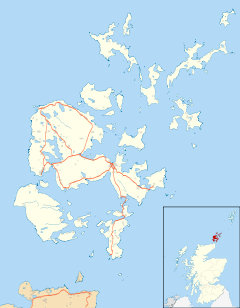Kirkwall
Kirkwall
|
|
|---|---|
 Kirkwall in August 2012 |
|
| Kirkwall shown within Orkney | |
| Population | 9,293 |
| OS grid reference | HY449109 |
| Council area | |
| Lieutenancy area | |
| Country | Scotland |
| Sovereign state | United Kingdom |
| Post town | Kirkwall |
| Postcode district | KW15 |
| Dialling code | 01856 |
| Police | Scottish |
| Fire | Scottish |
| Ambulance | Scottish |
| EU Parliament | Scotland |
| UK Parliament | |
| Scottish Parliament | |
Kirkwall is the largest town and capital of the Orkney Islands of Scotland. The town is first mentioned in Orkneyinga saga in the year 1046 when it is recorded as the residence of Rögnvald Brusason the Earl of Orkney, who was killed by his uncle Thorfinn the Mighty. In 1486, King James III of Scotland elevated Kirkwall to the status of a royal burgh; modern roadsigns still indicate "The City and Royal Burgh of Kirkwall".
The name Kirkwall comes from the Norse name Kirkjuvagr (Church Bay), which later changed to Kirkvoe, Kirkwaa and Kirkwall.
Situated on the northern coast of Mainland Orkney and with a population of about 9,000, Kirkwall is a port with ferry services to Aberdeen and Lerwick, as well as the principal north islands in the group. At the heart of the town stands St. Magnus Cathedral, which was founded in memory of Saint Magnus Erlendsson, Earl of Orkney 1108–1117 by Earl (later Saint) Rögnvald Kali. Next to the Cathedral are the ruins of the former Bishop's Palace and Earl's Palace. The town has two museums, the larger being Tankerness House Museum, which contains items of local historical interest within one of Scotland's best-preserved sixteenth-century town-houses. The prehistoric, Pictish and Viking collections are of international importance. The other museum is the Orkney Wireless Museum, dealing with the history of radio and recorded sound.
...
Wikipedia

